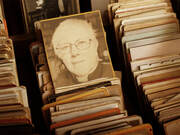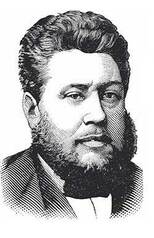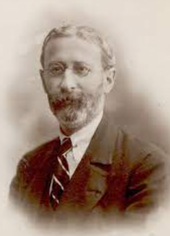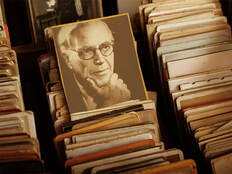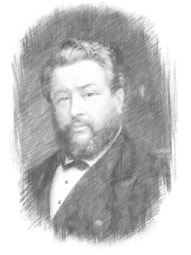I Corinthians 15
I Corinthians 15:1-2:
Moreover, brethren, I declare to you the gospel which I preached to you, which also you received and in which you stand,
2 by which also you are saved, if you hold fast that word which I preached to you—unless you believed in vain.
Moreover, brethren, I declare to you the gospel which I preached to you, which also you received and in which you stand,
2 by which also you are saved, if you hold fast that word which I preached to you—unless you believed in vain.
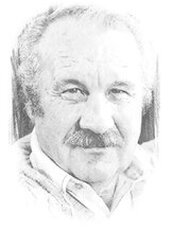 Ray Stedman
Ray Stedman
But he that glorieth, let him glory in the Lord. 18 For not he that commendeth himself is approved, but whom the Lord commendeth. (2 Corinthians 10:17-18)
Whenever anybody boasts, Paul says, it is to be in what the Lord has done. How that wipes out with one stroke all the proud evaluations you see people making of their own ministries! You never hear that from Paul. In the very next section he will tell us some of the things that happened in his ministry, but he does it with the most abject apologies. He is distressed that he has to talk about what he has done. He only defends his ministry because that is the kind of argument the Corinthians have been listening to from false teachers, and they seem to think it is important. A brief example of Paul's approach occurs in 1 Corinthians 15:10, where he says this about himself: But by the grace of God I am what I am, and his grace to me was not without effect. No, I worked harder than all of them--yet not I, but the grace of God that was with me. Some may think this sounds like boasting. But notice what Paul says: Yet not I, but the grace of God that was with me (1 Corinthians 15:10). Paul always recognizes that the only thing that counts is what Christ does in him, not what he does for Christ. --Ray Stedman
Whenever anybody boasts, Paul says, it is to be in what the Lord has done. How that wipes out with one stroke all the proud evaluations you see people making of their own ministries! You never hear that from Paul. In the very next section he will tell us some of the things that happened in his ministry, but he does it with the most abject apologies. He is distressed that he has to talk about what he has done. He only defends his ministry because that is the kind of argument the Corinthians have been listening to from false teachers, and they seem to think it is important. A brief example of Paul's approach occurs in 1 Corinthians 15:10, where he says this about himself: But by the grace of God I am what I am, and his grace to me was not without effect. No, I worked harder than all of them--yet not I, but the grace of God that was with me. Some may think this sounds like boasting. But notice what Paul says: Yet not I, but the grace of God that was with me (1 Corinthians 15:10). Paul always recognizes that the only thing that counts is what Christ does in him, not what he does for Christ. --Ray Stedman
The problem: The people at the church in Corinth needed a clear understanding of the resurrection through Jesus Christ. However, some did not believe in the resurrection: (1Co 15:12) “Now if Christ be preached that he rose from the dead, how say some among you that there is no resurrection of the dead?” What is the purpose of preaching, ministering or baptizing if there is no life after death? (1Co 15:29) “Else what shall they do which are baptized for the dead, if the dead rise not at all? why are they then baptized for the dead?” The Response: Paul clearly enumerated the appearances of Jesus following His crucifixion and resurrection, proving that He was alive, was not just a spirit, and possessed a body. To those who questioned how the body could be given life, especially considering the length of time spent in death as well as the manner of death, Paul states that the new body will be a spiritual one. (1Co 15:44) “It is sown a natural body; it is raised a spiritual body. There is a natural body, and there is a spiritual body.” It is the work of God to perform the resurrection, therefore it will never be completely understood by natural man. The Application: Jesus promised to prepare a place for His people, and often spoke of that place. (Mat 25:34) “Then shall the King say unto them on his right hand, Come, ye blessed of my Father, inherit the kingdom prepared for you from the foundation of the world:” These are just two of the many references to heaven. [Source: Lawrence Butler]
 Alan R Bevere
Alan R Bevere
I hate death, God hates death, and Jesus hates death... that’s why Jesus walked out of the tomb on Easter Sunday morning. Indeed, I understand that we can in our pain and grief welcome death. We cannot fathom the pain from the cancer that slowly eats away at our loved one's body. We no longer wish to witness the loss of our mother’s or father’s identity as Alzheimer’s ravages their brain. Death becomes a sigh of relief for us, a sad but reluctantly welcomed arrival. That is indeed the tragedy of life this side of perfection—the enemy of death itself is welcomed because we no longer wish to see the enemy do its dirty work on those whom we care about so deeply and dearly. So we welcome into our midst the very force that leads to our demise in the first place. It seems that death has us trapped. But death does not have the last word, “...in fact Christ has been raised from the dead, the first fruits of those who have died. For since death came through a human being, the resurrection of the dead has also come through a human being; for as all die in Adam, so all will be made alive in Christ” (I Cor 15:20-22). -Alan R Bevere; Death Is the Enemy 4/17/22
|
I Corinthians 15:22:
For as in Adam all die, so also in Christ shall all be made alive |
Adam’s death caused the death of his descendants; Christ’s resurrection guarantees that of His people. Christ came to restore what was ruined in Adam’s fall, hence Christ’s work produces the opposite effect of Adam’s.
|
|
I Corinthians 15:24:
"Then cometh the end, when he shall have delivered up the kingdom to God, even the father, when he shall have put down all rule and all authority and power." |
"The Last Days" refers to the period between Christ's past bodily resurrection and His future bodily return. Why is it termed "The Last Days?" Because it is the last period of God's redemptive work in the earth. The Last Days is the consummation of redemptive history--when we bask and work within the victory of Christ's death, resurrection, ascension, and session.
|
|
I Corinthians 15:44:
44 It is sown a natural body, it is raised a spiritual body. There is a natural body, and there is a spiritual body. |
The term “spiritual body” in 1 Corinthians 15:44 does not, in Paul’s original use, mean what the phrase seems to imply in English. [N. T.] Wright points out that to the original audience, a “spiritual body” understood as an “immaterial body” would be a contradiction in terms. There is no such thing. You might as well talk about solid mist or dry water. What Paul is doing, in context, is contrasting a body of flesh (which is the most common New Testament metonym for fallen humanity) with the body of the Spirit—that is, a body empowered and animated by the Holy Spirit. The Jews and Greeks had words for immaterial beings.
If Paul had meant for us to expect a non-physical resurrection, he could have spoken of “ghosts,” or “spirits.” He did not. For a man of his background, “resurrection” meant only one thing: To get up out of the grave, body and all, and walk again. Jesus left behind an empty grave devoid of flesh and bones. He took them with Him. And so will we. (1 John 3:2) -G. Shane Morris |
I Corinthians 15:45-49:
45 And so it is written, “The first man Adam became a living being.” The last Adam became a life-giving spirit.
46 However, the spiritual is not first, but the natural, and afterward the spiritual.
47 The first man was of the earth, made of dust; the second Man is the Lord from heaven.
48 As was the man of dust, so also are those who are made of dust; and as is the heavenly Man, so also are those who are heavenly.
49 And as we have borne the image of the man of dust, we shall also bear the image of the heavenly Man.
45 And so it is written, “The first man Adam became a living being.” The last Adam became a life-giving spirit.
46 However, the spiritual is not first, but the natural, and afterward the spiritual.
47 The first man was of the earth, made of dust; the second Man is the Lord from heaven.
48 As was the man of dust, so also are those who are made of dust; and as is the heavenly Man, so also are those who are heavenly.
49 And as we have borne the image of the man of dust, we shall also bear the image of the heavenly Man.
 John Blase Files
John Blase Files
While we still sorrow, the hope the apostle Paul talks about is that death doesn’t have the final say (1 Corinthians 15:54-55). There is something that follows, another word: resurrection. Paul grounds that hope in the reality of the resurrection of Christ (v. 12), and says “if Christ has not been raised, our preaching is useless and so is your faith” (v 14). If our hope as believers is limited to this world only, that’s just a pity (v. 19).
We will one day see those again who have “fallen asleep in Christ” (v. 18) — grandparents and parents, friends and neighbors, or perhaps even old schoolyard crushes. Death doesn’t get the last word. Resurrection does. --John Blasé
We will one day see those again who have “fallen asleep in Christ” (v. 18) — grandparents and parents, friends and neighbors, or perhaps even old schoolyard crushes. Death doesn’t get the last word. Resurrection does. --John Blasé
Physiologists have measured reflex arcs and found that the closing of the eyelid is the most rapid movement of all human reflexes.
There will be a dramatic sound, like a trumpet, that will call all believers home. Although there is a trumpet mentioned in Revelation 11:15, called the 7th trumpet of judgment, Greek scholars tell us that isn’t the same trumpet as this one in 1 Corinthians 15. After this trumpet, the most amazing thing happens as “the dead will be raised.” 1 Thessalonians 4:16–17 says that the bodies of dead saints will rise first and then the living saints will follow, removing all believers from the earth. -Pastor Ed Rea
There will be a dramatic sound, like a trumpet, that will call all believers home. Although there is a trumpet mentioned in Revelation 11:15, called the 7th trumpet of judgment, Greek scholars tell us that isn’t the same trumpet as this one in 1 Corinthians 15. After this trumpet, the most amazing thing happens as “the dead will be raised.” 1 Thessalonians 4:16–17 says that the bodies of dead saints will rise first and then the living saints will follow, removing all believers from the earth. -Pastor Ed Rea
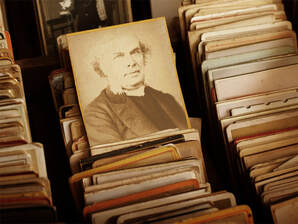 Horatio Bonar Files
Horatio Bonar Files
The history of six thousand years of evil has heen lost on man. He refuses to read its awful lesson regarding sin and God's displeasure against the sinner, which that history records. The flood of evil that has issued forth from one single sin he has forgotten. The death, the darkness, the sorrow, the sickness, the tears, the weariness, the madness, the confusion, the bloodshed, the furious hatred between man and man, making Earth a suburb of Hell -- all this is overlooked or misread. Man repels the thought that sin is crime which God hates with an infinite hate and which he, in his righteousness, must condemn and avenge.
If sin is such a surface thing, such a trifle as men deem it, what is the significance of this long sad story? Do earth's ten thousand graveyards, where human love lies buried, tell no darker tale? Do the millions upon millions of broken hearts and heavy eyes say that sin is but a trifle? Do the moaning of the hospital or the carnage of the battlefield, the blood-stained sword, and the death-dealing artillery proclaim that sin is a mere casualty and the human heart the seat of goodness after all? Do the earthquake, the volcano, the hurricane, the tempest speak nothing of sin's desperate evil? Do not man's aching head, and empty heart, and burdened spirit, and shaded brow, and weary brain, and tottering limbs utter -- in a voice articulate beyond mistake -- that sin is guilt? And do they not utter that guilt must be punished -- punished by the iudge of all -- not as a mere "violation of natural laws," but as a breach of the eternal law, which admits of no reversal: "The soul that sins, it shall die?" For without law, sin is nothing. "The strength of sin is the law" (1 Corinthians 15:56), and he who makes light of sin must defend moral confusion and injustice. He who refuses to recognize sin as guilt must dissolve the law of the universe or ascrihe imbecility and injustice to the Judge of all.
The world has grown old in sin. It has now more than ever hegun to trifle with it, either as a necessity which cannot he cured, or a partial aberration from good order which will rectify itself ere long. It is this tampering with evil, this refusal to see sin as God sees it, as the law declares it, and as the story of our race has revealed it, that has in all ages been the root of error and of wide departure from the faith once delivered to the saints. Admit the evil of sin with all its eternal consequences, and you are shut up to a divine way of dealing with it. Deny the evil of sin and the future results of that evil, and you may deny the whole revelation of God, set aside the cross, and abrogate the law.
---Horatius Bonar (The Everlasting Righteousness)
If sin is such a surface thing, such a trifle as men deem it, what is the significance of this long sad story? Do earth's ten thousand graveyards, where human love lies buried, tell no darker tale? Do the millions upon millions of broken hearts and heavy eyes say that sin is but a trifle? Do the moaning of the hospital or the carnage of the battlefield, the blood-stained sword, and the death-dealing artillery proclaim that sin is a mere casualty and the human heart the seat of goodness after all? Do the earthquake, the volcano, the hurricane, the tempest speak nothing of sin's desperate evil? Do not man's aching head, and empty heart, and burdened spirit, and shaded brow, and weary brain, and tottering limbs utter -- in a voice articulate beyond mistake -- that sin is guilt? And do they not utter that guilt must be punished -- punished by the iudge of all -- not as a mere "violation of natural laws," but as a breach of the eternal law, which admits of no reversal: "The soul that sins, it shall die?" For without law, sin is nothing. "The strength of sin is the law" (1 Corinthians 15:56), and he who makes light of sin must defend moral confusion and injustice. He who refuses to recognize sin as guilt must dissolve the law of the universe or ascrihe imbecility and injustice to the Judge of all.
The world has grown old in sin. It has now more than ever hegun to trifle with it, either as a necessity which cannot he cured, or a partial aberration from good order which will rectify itself ere long. It is this tampering with evil, this refusal to see sin as God sees it, as the law declares it, and as the story of our race has revealed it, that has in all ages been the root of error and of wide departure from the faith once delivered to the saints. Admit the evil of sin with all its eternal consequences, and you are shut up to a divine way of dealing with it. Deny the evil of sin and the future results of that evil, and you may deny the whole revelation of God, set aside the cross, and abrogate the law.
---Horatius Bonar (The Everlasting Righteousness)







